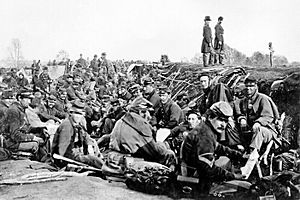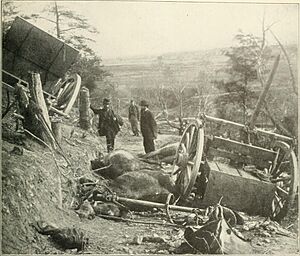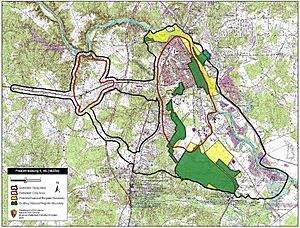Second Battle of Fredericksburg facts for kids
Quick facts for kids Second Battle of Fredericksburg(Second Battle of Marye's Heights) |
|||||||
|---|---|---|---|---|---|---|---|
| Part of the American Civil War | |||||||
 Pontoon bridges erected for Sedgwick's corps to cross upon, Alfred R. Waud, artist |
|||||||
|
|||||||
| Belligerents | |||||||
| Commanders and leaders | |||||||
| John Sedgwick | Jubal Early | ||||||
| Units involved | |||||||
| Army of the Potomac | Army of Northern Virginia | ||||||
| Strength | |||||||
| 27,100 | 12,000 | ||||||
| Casualties and losses | |||||||
| 1,100 | 700 | ||||||
| 2,000 | |||||||
The Second Battle of Fredericksburg was a fight during the American Civil War. It happened on May 3, 1863, in Fredericksburg, Virginia. People also called it the Second Battle of Marye's Heights. It was part of the bigger Chancellorsville Campaign.
Contents
Why This Battle Happened
Confederate Plans in Fredericksburg
Confederate General Robert E. Lee left Major General Jubal Early in charge of Fredericksburg. This was on May 1, 1863. Lee then marched west with most of his Army of Northern Virginia. His goal was to fight Union Major General Joseph Hooker at Chancellorsville.
Early's group had his own soldiers, plus a brigade from another division. They also had many cannons. Early was helped by Brigadier General William Pendleton. Later, another brigade joined Early, bringing his total strength to 12,000 men and 45 cannons. Most of these Confederate forces were south of Fredericksburg.
Early's Orders and Mistakes
General Lee told Early to watch the remaining Union forces near Fredericksburg. If Early was attacked and lost, he was to move south. This would protect the Confederate supply lines. If the Union forces moved to help Hooker, Early was to leave a small group behind and join Lee with the rest of his soldiers.
On May 2, Early misunderstood his orders. He left one brigade in Fredericksburg and started moving the rest of his forces toward Chancellorsville. Lee quickly corrected this mistake. Early then returned to his positions that night. This happened before the Union General Sedgwick found out about Early's move.
Union Plans Near Fredericksburg
Major General John Sedgwick stayed near Fredericksburg with his VI Corps. He also had parts of the I Corps and II Corps. General Hooker wanted Sedgwick to make a show of force near the city. This was to trick Lee about the Union's main plan.
On April 29, Sedgwick's troops took control of several river crossings. They quickly set up temporary bridges. Two divisions crossed the river early that morning. The I Corps was told to go help the main army at Chancellorsville on the night of May 1. On the evening of May 2, Sedgwick got new orders. He was told to attack Early with the soldiers he had left.
The Battle Begins
Union Attack on Marye's Heights
Sedgwick moved his soldiers into Fredericksburg at dawn on May 3. He joined up with another Union division that had crossed the river. Sedgwick first planned to attack the sides of Marye's Heights. But a canal and a stream blocked his way.
So, he decided to attack the middle of the Confederate lines on the heights. This area was held by Barksdale's brigade. The first attack, led by John Newton's division, failed. However, some soldiers from the 7th Massachusetts regiment saw something important. They thought the Confederate right side looked unprotected.
Breaking Through the Confederate Line
One Union officer asked for a short break in fighting to collect wounded soldiers. Colonel Thomas M. Griffin of the 18th Mississippi Infantry agreed to this without asking his commander. This allowed Union soldiers to get a closer look at the Confederate lines.
Sedgwick then launched another attack. He used soldiers from three different divisions. They pushed the Confederate forces off the ridge. They also captured some cannons. The first Union soldiers to climb over the stone wall were from the 5th Wisconsin and 6th Maine Infantry regiments. Barksdale's brigade had to retreat to Lee's Hill. He tried to make another stand there, but was forced to retreat south again.
After the Battle
Confederate Losses and Retreat
The Confederate forces lost 700 men and four cannons in this battle. General Early pulled his division back about two miles south. Another Confederate general, Wilcox, moved his troops west. These actions slowed down Sedgwick's advance. When General Lee heard about the Confederate defeat, he started moving two of his divisions east. He wanted to stop Sedgwick.
After the campaign, General Early got into an argument with Barksdale. Barksdale felt that Early had disrespected his brigade in a newspaper letter. The argument continued until General Lee ordered both generals to stop.
Union Losses and Next Steps
Sedgwick's forces lost 1,100 men during the fight. At first, Sedgwick began to chase Early's division. But then he followed the orders he had received the day before. He started moving west along the Plank Road toward Hooker's army at Chancellorsville. Gibbon's division was left behind in Fredericksburg to guard the city.
 | Kyle Baker |
 | Joseph Yoakum |
 | Laura Wheeler Waring |
 | Henry Ossawa Tanner |




